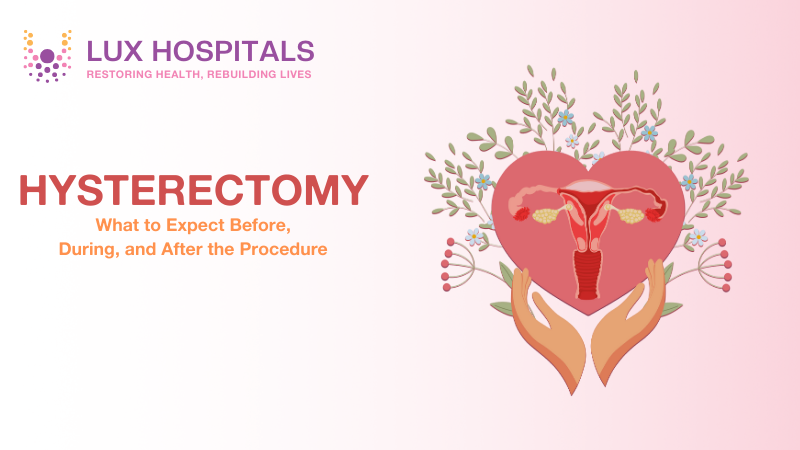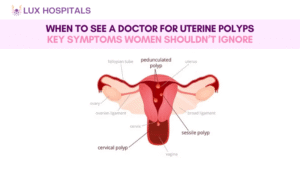What to Expect Before, During, and After a Hysterectomy: A Complete Guide

A hysterectomy is one of the most common surgeries for women, performed for various medical reasons like uterine cancer, fibroids, endometriosis, and chronic pelvic pain. Whether your doctor recommends a hysterectomy operation or you’re considering it yourself, understanding what to expect at every stage—before, during, and after the procedure—can help reduce anxiety and allow you to make informed decisions.
This article will walk you through the process of hysterectomy surgery, covering preparation, types of procedures (such as laparoscopic hysterectomy, vaginal hysterectomy, and abdominal hysterectomy), and recovery. By the end, you’ll have a clearer understanding of the procedure and what to expect throughout the process.
What is a Hysterectomy?
A hysterectomy is a surgical procedure in which a woman’s uterus is removed. Depending on the situation and what conditions are being treated, the procedure may also involve removing the cervix, ovaries, or fallopian tubes. There are several reasons why a hysterectomy surgery might be necessary, including:
- Uterine fibroids
- Endometriosis
- Uterine cancer
- Chronic pelvic pain
- Abnormal bleeding
- Prolapsed uterus
Before diving into what to expect before, during, and after the surgery, it’s important to understand that there are different types of hysterectomies, each with specific considerations. The most common types are laparoscopic hysterectomy, vaginal hysterectomy, and abdominal hysterectomy.
Types of Hysterectomy
Understanding the different types of hysterectomy surgery is crucial in knowing what to expect during the procedure and recovery. Here are the three main types:
1. Laparoscopic Hysterectomy
A laparoscopic hysterectomy is a minimally invasive procedure. Small incisions are made in the abdomen, and a camera (laparoscope) is inserted to guide the surgeon as they remove the uterus. This procedure is often preferred for women with smaller uteri or benign conditions because it typically involves less pain, a quicker recovery, and more minor scars.
The advantages of laparoscopic hysterectomy include:
- Shorter hospital stay (usually 1 to 2 days)
- Faster recovery (most women return to normal activities within 2 to 4 weeks)
- Minimal scarring
2. Vaginal Hysterectomy
In a vaginal hysterectomy, the uterus is removed through the vagina. This method is often recommended for women who have uterine prolapse or who have benign conditions. It does not require external incisions, so it typically results in faster recovery and less visible scarring.
The benefits of vaginal hysterectomy include:
- No external incisions, resulting in minimal scarring
- Shorter hospital stay (usually 1 to 2 days)
- Lower risk of infection and less blood loss compared to abdominal surgery
However, it may not be an option for women with large fibroids or other complicated conditions.
3. Abdominal Hysterectomy
An abdominal hysterectomy involves removing the uterus through a larger incision made in the abdomen. This procedure is typically used when the uterus is enlarged, when cancer is present, or when other conditions require additional surgical procedures such as the removal of ovarian cysts or tumors.
The advantages of abdominal hysterectomy include:
- Effective for complex cases or larger uteri
- Allows for the removal of surrounding tissues, such as the ovaries or fallopian tubes, if needed
However, this procedure comes with a longer recovery time (typically 6 to 8 weeks) and a larger scar compared to the other two methods.
Preparing for a Hysterectomy
1. Pre-Surgery Consultations
Before the hysterectomy operation, you’ll have a thorough consultation with your doctor to discuss your symptoms, medical history, and surgical options. The doctor will likely perform a physical exam, including a pelvic exam, and may order imaging tests like ultrasounds or MRIs.
Based on your diagnosis and the type of procedure you need, your doctor will explain the details of the hysterectomy surgery.
2. Pre-Operative Instructions
Your doctor will give you specific instructions to follow before the surgery. These may include:
- Fasting: Typically, you’ll be asked not to eat or drink for 8 to 12 hours before the surgery to reduce the risk of complications during anesthesia.
- Medications: Some medications may need to be adjusted or temporarily stopped, particularly blood thinners or any other medications that could increase bleeding.
- Pre-Surgery Tests: Depending on your health and the type of hysterectomy surgery, you might need blood tests, an ECG, or a chest X-ray.
- Arrange for Post-Surgery Care: You will need someone to drive you home after the procedure and assist with your care during the recovery period.
The Hysterectomy Procedure: What Happens During Surgery?
1. Anesthesia
When you arrive at the hospital or surgical center, you will be given anesthesia. Most women undergo general anesthesia, which means you’ll be asleep during the surgery. In some cases, regional anesthesia may be used, numbing only the lower part of your body.
2. Surgical Procedure
- Laparoscopic Hysterectomy: For a laparoscopic hysterectomy, small incisions are made in the abdomen. A laparoscope (a small camera) is inserted to allow the surgeon to see the area clearly. The uterus is then removed through one of the incisions.
- This type of surgery is less invasive, resulting in smaller scars and a quicker recovery time.
- Vaginal Hysterectomy: In this procedure, the surgeon makes an incision in the vaginal canal to remove the uterus. It is often performed when the uterus is prolapsed or when the condition can be treated without the need for large abdominal incisions.
- Abdominal Hysterectomy: For abdominal hysterectomy, the surgeon makes a larger incision in the abdomen, either horizontally or vertically, to access and remove the uterus. This procedure is typically used for larger uteri or more complicated cases, including the removal of ovarian cysts or when cancer is present.
3. Duration of Surgery
The hysterectomy surgery can take anywhere from 1 to 4 hours, depending on the complexity of the case and the type of surgery being performed. The doctor will remove the uterus and, in some cases, additional reproductive organs such as the ovaries or cervix. In most cases, the operation is relatively straightforward, but complications can arise in more complex cases, such as cancer.
After the Hysterectomy: What to Expect in Recovery
1. Post-Operative Care
After the hysterectomy surgery, you’ll be monitored in a recovery room as the anesthesia wears off. Some pain or discomfort is normal, but pain management options will be provided to ensure you remain comfortable. The length of your hospital stay will depend on the type of surgery performed:
- Laparoscopic Hysterectomy: Hospital stay may be 1 to 2 days.
- Vaginal Hysterectomy: Typically, a stay of 1 to 2 days is expected.
- Abdominal Hysterectomy: Hospital stay can range from 2 to 4 days or longer, depending on your recovery and any complications.
2. Managing Pain After Surgery
After surgery, you may experience some pain, swelling, or bruising. Your doctor will likely prescribe pain relievers to help manage discomfort, and you will be encouraged to move around as soon as possible to prevent blood clots.
It’s important to follow the doctor’s recommendations on managing pain and use any prescribed medications as directed. Avoid taking over-the-counter painkillers unless advised by your doctor.
3. Recovery Time and Limitations
The recovery time will vary based on the type of hysterectomy surgery performed:
- Laparoscopic Hysterectomy: The recovery period is generally shorter, with most women returning to work and normal activities in 2 to 4 weeks.
- Vaginal Hysterectomy: Recovery can take about 4 to 6 weeks. While there is less external scarring, the internal healing time is still significant.
- Abdominal Hysterectomy: This has the longest recovery period, often requiring 6 to 8 weeks for complete healing.
During your recovery, you will need to avoid heavy lifting, strenuous exercise, and sexual intercourse for several weeks. Your doctor will provide detailed guidelines on when it’s safe to resume activities.
4. Possible Complications
Though hysterectomy surgery is generally safe, there are risks involved, as with any major surgery. Some potential complications include:
- Infection at the incision site
- Heavy bleeding
- Injury to surrounding organs (bladder, urethra, bowel)
- Blood clots
- Emotional changes due to hormonal shifts, especially if the ovaries are removed
Your doctor will monitor you closely in the days and weeks following the surgery and provide treatment if any complications arise.
Long-Term Care and Emotional Well-Being
1. Hormonal Changes
If your ovaries are removed during the hysterectomy surgery, you will experience an immediate onset of menopause. For some women, this can bring about symptoms like hot flashes, night sweats, and mood swings. Hormone replacement therapy (HRT) may be recommended to help manage these symptoms.
2. Emotional Adjustment
It’s important to note that many women experience emotional and psychological changes following a hysterectomy. These can range from relief (especially if the surgery resolves long-standing symptoms like chronic pain or heavy bleeding) to sadness or feelings of loss, particularly if the ovaries are removed.
Seeking emotional support, either through counseling or support groups, can help with this adjustment.
Conclusion
A hysterectomy surgery is a life-changing event for many women, but with the right preparation and understanding, the process can go smoothly. By knowing the different types of hysterectomies and understanding what to expect before, during, and after the surgery, you can feel more confident in your decision and recovery process.If you or a loved one is considering a hysterectomy operation, it’s essential to discuss all options with your healthcare provider to determine the most suitable approach based on your medical history and specific needs.
Frequently Asked Questions
When a woman has a hysterectomy, her uterus is removed, which stops menstrual periods and makes pregnancy impossible. Depending on whether the ovaries are also removed, she may experience hormonal changes or enter menopause.
Yes, most women can return to their normal activities after recovering from a hysterectomy, typically within 4 to 8 weeks. However, the timeline and experience may vary based on the type of surgery and individual health factors.
To avoid weight gain after a hysterectomy, maintain a balanced diet rich in fruits, vegetables, lean proteins, and whole grains. Incorporate regular physical activity, such as walking or strength training, and stay hydrated. Monitoring portion sizes and managing stress through relaxation techniques can also help maintain a healthy weight.
Yes, a hysterectomy is generally a safe procedure when performed by an experienced surgeon. However, like any surgery, it carries some risks, such as infection, bleeding, or complications from anesthesia. Discussing potential risks and benefits with your healthcare provider can help ensure a safe outcome.
Lux Hospital assists patients with recovery and follow-up care after a hysterectomy by providing comprehensive post-operative support, including regular follow-up appointments to monitor healing. The hospital offers personalized care plans, pain management strategies, and access to physical therapy if needed. Patients are also guided on lifestyle adjustments, nutrition, and exercises to aid in a smooth recovery.




















